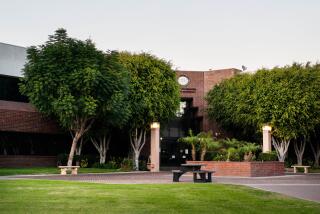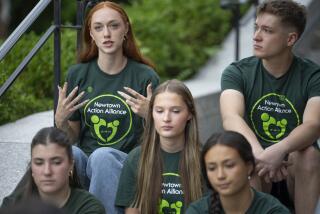Drew Grads Undeterred by Stream of Bad News
- Share via
Even as controversy persists over patient care at Martin Luther King Jr./Drew Medical Center, new graduates from its affiliated school of medicine pledged Saturday to improve the hospital and help provide the best healthcare for the poor.
Twenty-four students received medical degrees from the Charles R. Drew University of Medicine and Science in South Los Angeles, while 100-plus celebrated completing their residencies in a variety of disciplines.
“It’s sometimes hard to keep your perspective when your own school is in the headlines and the headlines aren’t good,” said Dr. Risa Lavizzo-Mourey in her keynote address. “The truth is that the news you read in the paper is only the first draft of history. It’s your job to revise that first draft every day.”
Lavizzo-Mourey is president and chief executive of the Robert Wood Johnson Foundation, a healthcare philanthropy based in Princeton, N.J. She received an honorary degree from Drew.
Charles R. Drew University was founded in 1966. The school’s mission is to train physicians and other health professionals -- particularly those who wish to work in communities where healthcare is lacking.
But state and federal inspectors, as well as groups that accredit training programs, have found numerous and serious lapses at King/Drew in the last year.
A cardiac monitoring ward was closed in December because some nurses allegedly couldn’t read patients’ bedside monitors, and in March the Willowbrook hospital’s pharmacy was found to have problems dispensing the correct medications to patients.
A national accrediting group also revoked the hospital’s and school’s right to train students in radiology, surgery and neonatology.
Last week, federal inspectors threatened to cut funding to the Los Angeles County-owned hospital because of its over-reliance on Taser guns to subdue mental patients.
Yet, many students said the hospital’s troubles did not derail their education -- and that they believe the training they received will serve them well in their medical careers.
“I think I’m prepared to work anywhere in the U.S. or the world,” said Dr. Claudio Ferreira, 35, who graduated from the ophthalmology residency program. “This is an underserved population and for training purposes, it’s great.”
Ferreira attended medical school in his native Brazil. He said he interviewed with 21 institutions for his next career move -- a fellowship -- and that his affiliation with King/Drew did not cost him any opportunities.
“I think all this is politics, it’s not real,” said Dr. Jamal Siddiqui, a graduate of the pediatrics residency program. “Nobody is perfect, and it’s not like it’s unprofessional [at the hospital] all the time. Every hospital has a few bad people on the inside, but this is a great institution.”
School officials said Drew University continued to draw students from around the world. Officials also said competition remained intense to get into the school -- precisely because many students wanted to train in a busy public hospital that treats severely ill patients who have a wide range of medical conditions.
“We have kids who could have gone anywhere and they come here,” said Dr. Marcelle Willock, the dean of Drew’s College of Medicine.
Dr. Showkot Ara Rahman, a Bangladesh native, said she had sought a pediatrics residency program that would allow her to care for the underprivileged.
“I grew up in a poor country, and it’s sad that poor people often have no power to get the right treatments,” she said.
She said that the last year has been nerve-racking because she was unsure if her residency program might also be found to have problems. Nonetheless, she is eager about her next move -- a fellowship in ambulatory pediatrics at King/Drew -- and hopes to land a job at the hospital some day.
Dr. Alan Dakak, 25, is American but comes from an area that to South Los Angeles might seem foreign: suburban Orange County.
He said his grandfather and father were doctors. Dakak said a stint doing volunteer work in a Los Angeles hospital inspired him to also become a physician.
“That was a great experience, and I found it very enriching to work with a lot of people who really needed my help. I wasn’t just standing on the sidelines,” Dakak said.
He too said he targeted Drew University because of its affiliation with King/Drew hospital. The hospital’s recent troubles, Dakak said, had little effect on his day-to-day education.
“The attending [physicians] and residents are here for the patients and they work hard,” he said. “I think sometimes there are going to be some nurses or staff who are slower; but in general most of them are very good, and I would say most of the patients who come out of here, come out happy.”
More to Read
Sign up for Essential California
The most important California stories and recommendations in your inbox every morning.
You may occasionally receive promotional content from the Los Angeles Times.













